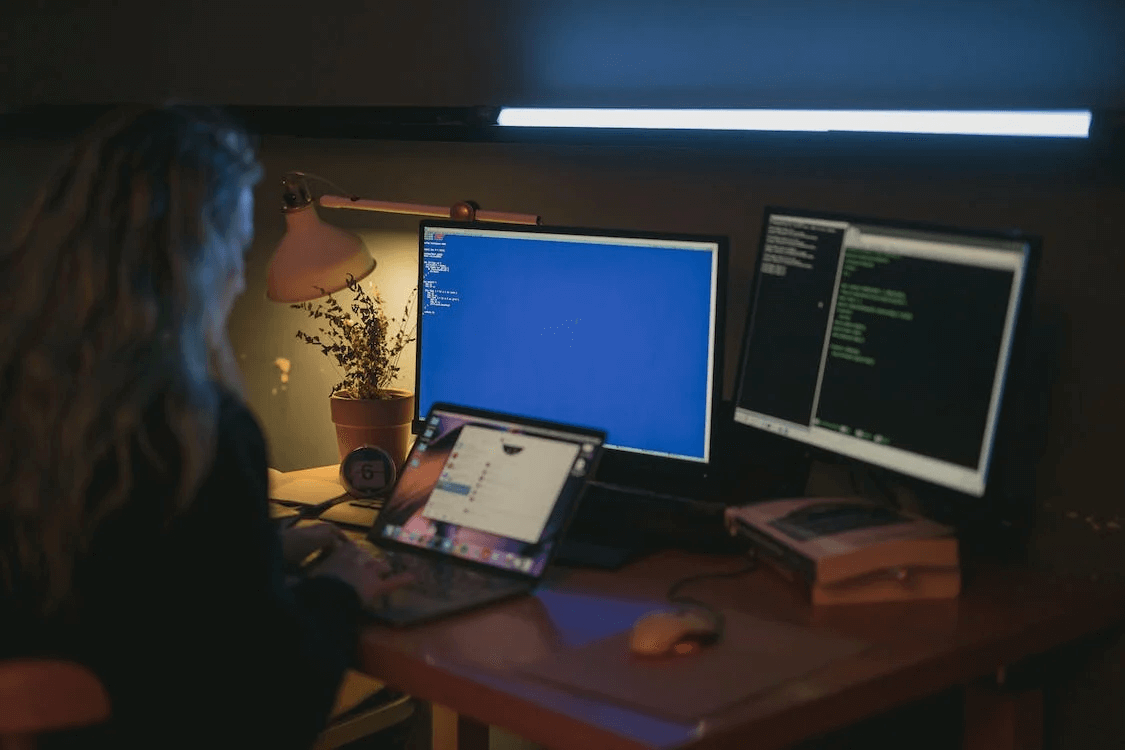Full Stack Developer vs. Software Engineer: Which Career Path to Choose?

More and more people are considering careers in software engineering or web development. In fact, these are some of the top fields in the technology industry and offer many exciting job options. However, these jobs have specific differences that set them apart from each other.
We’ll lay all of this information out for you so that you can understand all the details. By the end of this article, you’ll know plenty about a career as a software engineer and a full-stack developer. Then, you’ll be ready to make an informed career decision.
Related: What is a Software Engineer and How Do I Become One
What Is a Full-Stack Web Developer?
A full-stack developer works on a website or web application. However, they don’t just work on a single piece; they take on the entire challenge. This includes programming on both the front end and back end. This makes them one of the integral factors in keeping a successful website going.
What Does a Full-Stack Developer Do?
The work of a full-stack developer is all-encompassing, so, as you can expect, it involves a lot of different aspects. However, caring for the website or web-based application is at the core of all this. This involves all the tasks that go into creating and maintaining it.
This includes straightforward tasks like developing protocols that allow different programs to work together. It also includes ensuring that the website or application works just as well on mobile devices as on desktops.
However, full-stack developers aren’t just on their own all day. They must work with the website’s designers to help bring the agreed-upon design to life. In many cases, this makes full-stack developers at least partially responsible for the website’s visual appeal as well. Meanwhile, a project manager will have their hands on the website as well, coordinating everything needed to get the job done.
Once the website or application is up, the developer’s work isn’t done. After all, a website isn’t good for anything if it shuts down immediately after starting. This involves testing and debugging. If there is a problem, they will have to find a solution.
Required Skills
With a range of tasks that need to be completed, full-stack developers must have the skills necessary to complete these tasks.
This starts with a fundamental knowledge of what goes into creating and maintaining a website. For this, a full-stack developer must understand and be familiar with computing languages directly related to web development. This includes HTML, CSS, JavaScript, and more.
It also means understanding other concepts more related to this field. This includes understanding databases like MySQL, Oracle, and NoSQL. It also includes understanding back-end programming languages like PHP, Java, Python, and more.
Basically, a full-stack developer needs robust, all-around knowledge of anything related to web development.
Considering using a coding bootcamp to get the skills and knowledge you need? Attend an info session with Sabio and determine if it’s right for you.
Salary
The average salary of a full-stack developer is $101,070. However, the actual salary of a full-stack developer can fall below this for entry-level positions and rise far above it for more advanced ones.
What Is a Software Engineer?
Once again, the title of this professional explains it all. A software engineer is responsible for engineering software. This means that they design and develop it for any piece of equipment that needs software to run.
What Do They Do?
A software engineer can be responsible for any number of different steps along the software creation process. They may be working on a single step in the process for an intense project, with the team around them working on the rest. For smaller projects, they may be responsible for many steps across the entire process. Higher-level and more senior software engineers may also work on large projects where they oversee people working on individual steps and, thus, have additional responsibilities.
These steps are varied and include plenty of different tasks. This starts with designing and creating the software and working alongside the client to ensure this process goes according to their wishes. It also includes finding ways to improve and optimize software, implementing updates, and overseeing documentation.
Many software engineers are also heavily involved in testing. They ensure that the software works correctly and take steps to fix the issue if it doesn’t. This includes integration testing, system testing, unit testing, and more.
Related: Back to School: How A Coding Bootcamp Can Accelerate Your Career
Required Skills
To do all of this, software engineers need a toolbelt of skills. Most of these skills directly relate to programming, but some go beyond this.
The top programming skill is fluency in a few key programming languages. The top languages a software engineer should know are Java, Python, and C++. They should also be familiar with working on and testing software in general. Some direct experience in this field is always helpful.
On top of these programming skills, software engineers must have specific soft skills. These include a creative approach to problem-solving, the planning skills required to execute a project properly, enough communication skills to work with a team, and plenty more. Strictly what skills are required and to what degree they are required will depend on the specific job. For example, communication and teamwork are more critical when working with a large group.
Salary
The average salary of a software engineer is around $106,746 per year. However, this is an average, as many salaries in this field will fall above or below this number.
Ready to start learning the skills you need for your new tech career? Apply to join our coding bootcamp today.
Which Should You Choose?
Ultimately, there are a lot of similarities between a career as a full-stack developer and a software engineer. Both require knowledge of coding languages, benefit from field experience, and pay a similar salary.
However, there are definitely some differences as well. For one, the coding languages required by both are vastly different. Becoming a full-stack developer will be easier if you already have experience in languages like HTML. If not, you will want to look into a coding bootcamp to polish your skills.
Both also require different personal skills that you should consider. For example, a career as a software engineer will often require more personal skills than a full-stack developer.
In addition, consider the things that actually interest you. If you like HTML and think the idea of creating websites sounds fun, you may want to consider becoming a full-stack developer. Meanwhile, if you like actually creating software, becoming a software engineer is the obvious choice.
Full-Stack Developer and Software Engineers
No matter which path you choose, you will be able to achieve success in both of these fields. Picking the one that best suits you will ensure you can do this well. So, consider your options and make the choice you need to make.
Related: How to Prepare for a Full Stack Developer Bootcamp
Posts you might like
- Navigating the Tech Job Market: Insights from Sabio Alumni and Cybersecurity Opportunities
- Embracing the Climb: A Leader's Growth Mindset Journey
- This is the Perfect Time to Dive into Coding and Automation, This is Why!
- Troubleshoot Like a Pro: The Art of Debugging in Programming
- Beyond Bootcamp: Diverse Career Avenues in Tech
- Spotting Burnout in Tech Job Hunts: 6 Warning Signs & Ways to Overcome It
- Get Hired: Essential Knowledge for Emerging Programmers
- 7 Steps to Build a Personalized Continuous Learning Plan for Coders
- Empower Your Journey: Benefits of Remote Code Bootcamps
- Proactive Steps: Daily Rituals for the Job-Hunting Programmer
- Don't Sabotage Your Tech Job Search: Mistakes to Skip
- Unleashing Opportunities: How Bootcamp Career Services Propel Success
- From Lines to Offers: How Your Coding Experience Shapes Market Value
- Optimizing Success: Your Attitude in Coding Bootcamps
- Roadmap to Success: Tech Job Hunt with a Coding Bootcamp Mentor
- Crafting Your Tech Startup Roadmap from Bootcamp Grad
- Tips for Creating a Resume That Gets Interviews for High-Experience Jobs After Coding Bootcamp
- Accelerate Your Career: Embrace Bootcamps for Real-World Programming Skills
- The Coding Craft: Essential Skills Learned at Bootcamps
- Bootcamp Bonds: Tapping into Networks for Tech Employment
- Coding Confidence Booster: The Benefits of Coding Mock Interviews
- Programming by the Clock: The Impact of Effective Time Management
- Coding Freedom: The Value of Learning at Your Own Speed
- Calm Code Journey: Overwhelm-Free Bootcamp Success
- Polish Your Pitch: Tech Interview Communication Essentials
- Inside the Loop: Coding Bootcamps and Tech Industry Strategies
- From Zero to Hired: Decode the Experience Question in Tech Interviews
- Solving the Puzzle: Refining Your Problem-Solving as a Programmer
- The Art of Practicality: Using Coding Languages Without Overlearning
- Practice Makes Perfect: The Key to Software Engineering Brilliance



